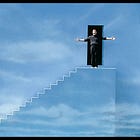#32 Adulthood doesn't need to be overwhelming
Adulthood gives us more than ever - but it takes more than ever. So here's the truth: You can't drift into it. You must carefully design it. Here's how.
👋 Hey! We’re Alex & Marc, two longtime friends and curious minds.
Welcome to 3x, a publication about living a meaningful life. We explore ideas that help us live wiser, freer and more intentional lives.
Join 3,000+ weekly readers growing a life with more clarity and depth, one post at a time.
The unhappiest time of your life
Most of my friends are in the thick of it: big jobs, kids, new houses, closer to their parents. Life is full, meaningful, rewarding.
And yet, they are exhausted.
This isn’t just in your head. Studies show that happiness follows a U-shaped curve—high in youth, declining through adulthood, and then rising again later in life.
There’s more data to it. Anxiety and depression are rising sharply among middle-aged adults. More than half of employees aged 30-45 report feeling persistently exhausted. Divorce rates peak in midlife.
So what’s happening? Why does life feel heavier when we’re supposed to be hitting our stride?
How we got here
1. The natural course of life
Life naturally gets more complex.
Work becomes more demanding. The days of just doing your job are over. Now, you’re expected to lead, mentor, and keep up with constant change.
Family responsibilities grow. You’re raising kids, supporting aging parents, or both.
Financial pressures increase. Mortgages, education costs, future security.
Social connections decline. Friends move away, work takes priority, and loneliness kicks in.
It’s a slow shift. You don’t notice it happening—until one day, you do.
2. The broken social contract
Previous generations had a simple deal: work hard, and life will reward you. That’s no longer the case.
Wages stagnated. Costs exploded. In the US, since 1963, home prices have increased 3x, while the median household income increased about 1.5x.
Baby boomers hold the wealth. In 1989, boomers in their 30s owned 21% of U.S. wealth. Millennials at the same age? Less than 5%.
Work is more demanding. The 9-to-5 became 24/7 availability—emails, meetings, side hustles.
Retirement is uncertain, with social security feeling like a ponzi scheme that will blow up before you retire.
And comparison, fueled by social media, makes it worse. If expectations for adulthood weren't big enough, Instagram made them worse.
Yes, the system is broken. But you can’t fix it. Let's focus on what you can control.
The way forward
Adulthood gives us more than ever—but it also demands more than ever. If we’re not careful, the most meaningful stage of life can become the most exhausting.
Here’s the hard truth: you can’t drift into it. You must design it with intention.
Adulthood requires a shift—a new identity, a new mindset, and a new way of structuring life itself.
1. A new identity: love
In your 20s, ambition and achievement drive you. Your title, your income, your accomplishments define who you are. Rightfully so in an era that demands personal and professional growth.
But adulthood demands a new identity. The focus of life has to shift—from what you can take to what you can give. From building for yourself to building for others.
All religions figured this out. Call it Reciprocity (Christianism), Karma (Hinduism) Sadaqah (Islam) or Dana (Buddhism).
“Whoever wants to save their life will lose it, but whoever loses their life for others will find it” Matthew 16:25
If you’re not into religion, here’s the hip-hop version of it:
“It ain’t no fun if the homies can’t have none.” Snoop Dog
The next phase of life is not about doing more. It’s about becoming more.
Success is no longer just personal—it’s about family, love, and community. You can fight it, or you can embrace it.
Stop defining yourself by what you achieve or what you have. Instead, define yourself by who you are and who you love.
2. A new mindset: Amor Fati
Redefining your identity is just the first step. The second is learning to let go.
In your 20s, success comes from control. You plan, optimize, and push forward, believing that if you work hard enough, things will go your way.
But in adulthood, control starts slipping through your fingers.
You can’t control your teams. You can’t control your kids. You can’t control your parents’ health.
This is where Amor Fati comes in—the Stoic idea of not only accepting fate, but loving it. Instead of resisting life’s unpredictability, embrace it. Instead of obsessing over what you can’t change, find power in what you can.
3. A new life: redesigning work around life
With a new identity and mental model, it’s time to fix your calendar. A life centered on caring and giving likely requires rethinking how you work.
And here lies the hardest challenge: working less at the exact moment when you probably need to earn more.
Figuring this equation out is not easy. It won’t happen overnight. It’s a long-term game, not a quick fix.
But if you don’t start reshaping your life now, you’ll keep running in circles—more work, more pressure, less time for what actually matters.
The first step is a redesign. Figure out your ideal calendar is. Hint: Instead of working and fitting life around it, live—and fit work around it.
The second step is intention. If you don’t make deliberate choices, the system will make them for you.
The third step is execution. While we don’t have all the answers, we know you have two options:
Work less. The only way to do so is by increasing productivity. And the only way to increase productivity is by becoming great at what you do. And the only way to become great at what you do is to find something you enjoy. Mastery buys time (and leverage!)
Work more flexibly. If your job doesn’t allow it, find ways to shift. Focus on results, not hours—prove your value and push for remote days or a better schedule. Strong skills give you leverage, and roles built on output, not time, offer more freedom. If your industry is rigid, look for one where flexibility is the norm.
Flexibility isn’t given—it’s created.
This isn’t about escaping work—it’s about making it sustainable. A life where work serves you, not the other way around.
(We wrote about how to make this shift in more detail in the following post)
Adulthood by design. Not default.
This is the paradox of adulthood—it gives you more than ever, but it also takes more than ever.
The problem isn’t just the system. The problem is failing to acknowledge that adulthood is different—and demands a different version of you.
You can let life pull you in every direction—more work, more pressure, more comparison.
Or you can take control.
Design your adulthood.
Thanks for reading 3x!
If this resonated with you, hit the ❤️ and leave a comment—it means a lot. And if you know someone who’d appreciate it, share it via email, WhatsApp, or on social media. Good ideas are better when shared.
Subscribe just below to stay in the loop. 👇
Related articles








Great advice!
Sensational transition from religion to hip-hop btw 🤣